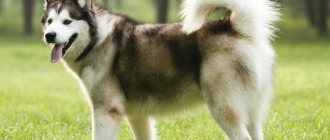The German Shepherd can rightfully be considered a universal breed. She can be a loyal, devoted friend, a good companion, an excellent watchdog and service dog, and perform many of the tasks assigned to her. Germans are smart, easy to learn and train, and easy to care for. Many people dream of having just such a dog. But before you bring home a four-legged friend, approach this issue responsibly. Feeding your German Shepherd is key to a long, healthy life. And although these dogs are undemanding in food, a large breed requires careful selection of diet and menu, which is quite troublesome and entails considerable expenses. A lot of specialized literature is devoted to the question of what to feed a German Shepherd, where proper feeding schemes are described in detail and there are even recipes for dishes.
Nutritional Features
The best option in this case is dry food for German shepherds. Such solutions are easy to use and do not require any additional hassle. No need to cook a pot of soup for your pet and worry about his food spoiling. There is also no need to worry about vitamins for young animals. A good dry food for German Shepherd puppies contains all the minerals and vitamin groups necessary for a growing body.
Separately, it is worth noting that if your pet suffers from problems such as allergies, skin rashes, obesity and diseases of the internal organs, then you cannot do without proper nutrition.
We will try to find out which food is best for a German Shepherd. Let's consider popular brands that are respected among breeders and have many positive reviews, and we will also look at the features of feeding a pet.
Holistic
What’s interesting: the cost of holistic food for German shepherds is sometimes noticeably lower than the price of super-premium and even premium food. The fact is that the manufacturers of the latter spend a lot of money on promoting the product, which is why the price is so inflated.
The best brands of holistic food for German Shepherds:
- "Akana".
- "Artemis."
- Orijen.
- "Innova".
- Canidae
- Felidae
- "Evo."
This is the best food for dogs - balanced and without a hint of harmful chemicals. But you have to pay good money for exceptional quality.
Premium
Premium and super-premium food for German shepherds also contains meat products, but in a smaller volume. Semi-finished products predominate here. In addition, these classes offer a lot of specialized solutions. For example, food for German Shepherd puppies or pregnant animals.
The best premium and super-premium brands:
- "Frolik."
- Hill's.
- "About Pak."
- Royal Canin.
- “Dr. Alders."
- Eukanuba.
- "Purina Proplan".
Economy
Here we have inexpensive foods that can be found in almost any store, while more noble classes are sold at specialized sales points. Such solutions do not contain meat, but only by-products, such as hooves, feathers and fat.
In addition, such food is richly flavored with cereals and soy. Breeders and veterinarians believe that feeding your pet economy-class products is not worth it. This especially applies to pregnant animals and young animals. Of course, what kind of food to feed a German Shepherd puppy is a personal matter, but in this case the pet will not receive all the elements necessary for the growth of the body. Due to a lack of vitamins and minerals, the immune system will be weakened, and the puppy will become more susceptible to disease.
Popular economy class food:
- "Chappie."
- "Baron".
- "Our brand."
- "Purina Dog."
If you feed your pet such foods, do not forget to give him additional vitamin complexes. Breeders or veterinarians will help you choose the latter.
Diet of a German Shepherd under one year of age
Everything is clear about how to feed a German Shepherd puppy at 6 months and earlier. After six months, the diet remains virtually unchanged. Only the volume of one meal increases. Also, it is worth removing from the dog the bone with which he previously played. His teeth are already very strong and he can easily bite through it. This is dangerous, because small and sharp pieces from the bone can get into the stomach and cause a lot of problems.
Prohibited foods and general recommendations on how to properly feed a shepherd puppy
In addition to healthy foods, you should also know the list of those that should not be given to puppies. Failure to follow this warning may result in serious health problems for your dog.
Never give puppies poultry bones, especially chicken bones. When you offer your dog chicken, make sure that it is well cleaned of bones, because the stomach of a young shepherd dog is not able to digest them. As a result, even internal bleeding may occur.
There is no need to feed your dog tails, vertebrae and chicken necks. They tend to get stuck between the teeth, causing increased salivation and gagging.
Some people try to feed the puppies mashed potatoes, but this is prohibited because it can cause diarrhea.
Also, every shepherd owner should beware of the following:
- Expired products and stale food;
- Overdose of vitamins and special mineral supplements. This can lead to gastric volvulus and bone abnormalities;
- Food with added spices. This refers to food that was prepared for people;
- Too hot or, on the contrary, cold food straight from the refrigerator;
- Bad water. Speaking of water, it should be of high quality, the kind that the owner himself drinks. You can give boiled water, but not often, since it does not contain the necessary nutrients. A dog should not drink dirty water from a puddle;
- Sticky overcooked porridge, especially barley porridge.
- Pork;
- Smoked products, questionable sausages;
- Sweets;
- It is impossible for one of your acquaintances and friends to feed the dog with unknown products without the owner’s knowledge.
- And finally, overfeeding is not beneficial for the puppy. It is worth understanding that the dog must receive only the necessary amount of food and nutrients for normal development. Obesity entails many associated serious problems.
We tried to tell you in as much detail as possible about all the nuances of how to feed a German Shepherd puppy. Each case is individual, and the veterinarian can create the most accurate menu only after examining the puppy. And remember, these dogs have very good genes, but only proper care will help them grow into truly healthy, strong and beautiful dogs.
Rules for feeding German Shepherds
The first step is to get the right bowl for your shepherd. It should be high enough to prevent your pet from eating from the floor. Otherwise, the musculoskeletal system will suffer. It is also worth taking into account some of the dog’s individual characteristics.
How active she is, her age and gender. Be sure to pay attention to fur and stool. The choice of food depends on all these factors. Experts do not recommend carrying out prolonged experiments with nutrition. If your pet loves one brand and eats it with pleasure, then you should not switch to another. At least not more than once a quarter.
In addition, you cannot immediately change one food for another. New food must be added in small portions, gradually displacing the old. That is, it will take at least a couple of weeks to completely replace one solution with another.
Also, experts do not recommend mixing pasture from the human table with industrial diets. In principle, no one forbids giving your pet natural products, but only at a separate time, and not together with dry food.
Portions and frequency of feeding a German Shepherd
Breeders and veterinarians recommend feeding this breed no more than twice a day. It is also worth choosing a specific time and strictly following the daily routine. The dosage depends on the content of nutrients and must be indicated on the product packaging.
Holistic class food is more practical in this regard. A small portion is enough for a shepherd dog to be completely satisfied. While economy class solutions are consumed noticeably faster. In a good half of cases, a 10-kilogram package of premium food lasts for a month.
Veterinarians strongly do not recommend overfeeding dogs and German shepherds in particular. Although the breed is not prone to obesity, a “kind” owner can turn a pet into a kind of ball on its paws. It’s good if the problem is only with excess weight, but overfeeding is fraught with volvulus. And this is a risk of death. So you shouldn’t buy into your pet’s pitying eyes, but strictly follow the daily routine and menu.
homemade food
It is also important to determine what foods to feed your German Shepherd, how to feed it correctly, and then implement the diet into your pet’s life. What's better?
Recommended Products:
- meat - pork, beef and chicken. For better absorption, it is better to divide the portion of meat into two parts and give it at different times of the day. It is not necessary to cook the meat, although it is better to boil it;
- fish is given only from the fourth month, but not more than twice a week. Sea fish is most suitable;
- eggs are given no more than three times a week, boiled;
- Among dairy products, it is better to prefer kefir, fermented baked milk and cottage cheese;
- porridges are prepared with milk or water; oatmeal, millet, rice and buckwheat are recommended;
- Vegetables and fruits begin to be given from the third month of life, preferably raw and cut into small pieces; it is better not to add salt and oil at all.
Remember that most of the diet consists of proteins (about a third), fats - no more than 15 g per kg of weight per day.
Feeding tips
Once you have decided which food to choose, how many times to give it and how to do it correctly, take note of a couple more tips:
- avoid overfeeding;
- calculate the portion taking into account age, weight and activity;
- serve food warm;
- the best form for food is thick sour cream or puree;
- teach your dog to vegetables and fruits from the third month of life;
- monitor your water balance;
- It is better to give food at the same time;
- do not let the dog swallow food, it should chew it gradually;
- It is better to purchase dishes for a shepherd with adjustable height.
It is important that your pet's stomach is never empty. Due to its large size and mobility, intestinal volvulus and gastric displacement may occur.
Feeding German Shepherd puppies
It is important to know that up to one and a half months, young animals should eat only milk. Moreover, he does this at least 10 times a day. Upon reaching one and a half months of age, you can add porridge, soups, purees and pure protein in the form of meat and fish to the diet.
Only when the puppy turns three months old should he be gradually switched to dry foods. This should not be done immediately, but gradually, replacing natural food with industrial food. Breeders recommend adding 25% of the store-bought solution every three days.
From about four months of age, the number of meals should be reduced to 4 times a day. Six-month-old shepherd dogs are fed three times a day. And after a year they transfer to adults twice daily meals.
Food for puppies differs in composition from similar food for adults. As mentioned above, veterinarians strongly do not recommend buying economy class solutions for young animals. During the first year and a half, the dog’s skeletal system is formed, so during this period it is better to spend money on holistic or at least super-premium food.
Basic Rules
The diet of a German Shepherd should take into account not only the composition of the food and its calorie content, but also the amount of exercise and the temperament of the animal. If the dog is walked a lot and is physically and emotionally engaged, the extra calories will be burned easily. A large amount of fatty and carbohydrate foods will not harm such a pet. For a calm-tempered, sedentary shepherd dog, excess nutritious food is contraindicated.
It is important not to overfeed the dog, which can lead to a deterioration in general health, vascular diseases and obesity. Overeating is especially dangerous for pets that are excessively active after eating. The stomach of German Shepherds is too loose in the abdominal cavity and can become twisted under active loads.
Experienced dog owners are advised to adhere to the following rules:
- The German is given food twice a day, at the same time, in a slightly warm state;
- feeding is done only after a walk;
- the food should be thick - the shepherd’s stomach does not digest liquid food well;
- for the proper development of the dog’s musculoskeletal system, it is recommended to purchase a special stand that raises the bowl to chest level;
- make sure that the dog always has clean water;
- when refusing food, if the food remains untouched for half an hour, the bowl is removed;
- do not indulge in delicacies from the table;
- you are not allowed to growl when you touch the bowl, allowing the dog to feel superior to the owner;
- from an early age, accustom the dog to fresh vegetables;
- Fresh meat is preferable, but with the condition that the animal is regularly treated for worms.
How much and how often to feed
How much a German Shepherd eats per day depends on the animal’s age, activity, and the dog’s health.
How many times a day should you give your puppy food? A large amount of food at an early age will cause obesity in a dog within a year. Breeders recommend:
- in the absence of mother's milk, newborn puppies are given water on their own six times a day for a month;
- at 1-2 months the dog is given one glass of food, divided into portions, in 5 doses;
- from 2 to 3 months -1.5 glasses for 5 feedings;
- from 4 months to six months - fed with a liter of food, divided, as for young dogs, into 4 meals;
- further, up to a year - give 0.5 liters per day, feed 3 times a day.
At the age of one year, the dog is considered an adult; it is transferred to two meals a day, one and a half liters in volume. In summer, when it is hot, it is permissible to feed an adult dog once. After giving birth, a shepherd dog is fed often, at least 4-5 times a day.
An old or sedentary dog is given food 2-3 times a day. At the same time, the daily feed intake is not increased: a whole portion is given in the morning, half the norm in the afternoon and evening.
What can a German Shepherd do?
The German Shepherd's diet should contain from 50 to 70% protein food in the form of meat pulp, devoid of bones, fat and skin, offal, eggs, cottage cheese and milk. Carbohydrates are allowed 20-30%. These are cereals (porridges) and vegetables and fruits. Fats, animal and vegetable, need about 10-20%. It is better if it is unrefined vegetable oils.
For the correct formation of the skeleton, the shepherd dog must include mineral supplements containing bone meal, phytin and calcium in the menu.
Meat, fish, and vegetables can be given to your dog raw.
What not to do
Nutritional recommendations can be given by the breeder or club through which the dog was purchased. The following prohibited foods should be excluded from the menu:
- flour, including pasta;
- legumes;
- potato;
- sausages, frankfurters, smoked meats;
- raw river fish;
- pork;
- confectionery;
- pickles, pickled products;
- citrus;
- spices;
- grape;
- sorrel;
- small and sharp poultry bones are not digested by the body and damage the walls of the stomach and intestines.
Natural nutrition
Veterinarians strongly advise against feeding your German Shepherd both natural food and dry industrial products. But breeders do not have such a clear opinion on this matter. They sometimes pamper their pets with fresh beef or vegetable stew.
But here it is necessary to monitor the animal’s well-being and especially its stool. If after such experiments it becomes liquid, then it is better to refuse such feeding. In addition, treats should not be too frequent. Natural food can be given no more than once a week. It is also worth remembering foods that are prohibited for shepherds.
Prohibited products:
- any fried food;
- sweets;
- smoked meats;
- flour products;
- salty food;
- fatty foods;
- food high in starch.
Consumption of the products described above can lead to serious consequences: problems with the gastrointestinal tract, deterioration of hair, loss of activity, etc. If you are not sure whether the natural food from your table contains these elements, then it is better to abandon such bait altogether.
Natural feeding
It is better to feed your German Shepherd natural food: your pet’s diet will contain many useful substances, fresh and high-quality food. You will have to spend a lot of time preparing acceptable food. Although a dog does not require a varied diet - a daily change of dishes, it is necessary to provide the animal with the necessary composition for the benefit of the body.
Animals need to be fed meat. The product is considered the main source of protein and is necessary for every dog. Meat is given with caution; in addition to the benefits, harm is likely. For better absorption, try to divide the daily intake into several servings, offering them at different times. Poultry meat up to two months of age is best served boiled.
When the baby turns 4 months old, offal is introduced into the diet. Everything except the liver is served raw. The organ often contains microbes and germs of worms. When feeding a German Shepherd puppy an offal, the treat will need to be thoroughly crushed for better absorption.
The body will receive minerals and nutrients from fish. The energy value of the product is lower than that of meat; the portion of fish by weight is 1.5 times. Give fish 1-2 times a week. For puppies, the carcass is removed from the bones, but an adult shepherd dog will eat fish with bones. River fish must be boiled; fish that carry helminths live in fresh water. Fish is given to German Shepherd puppies twice a week from 4 months. If you decide to treat your pet to such a product, it is not recommended to feed it meat these days.
Know! Excessive consumption of fish products is dangerous for a dog; the substances contained in fish gradually destroy the B vitamins present in the body, which leads to growth retardation and digestive problems.
It is acceptable to offer bones to your shepherd dog. Puppies chew on sugar bones, which trains their jaw muscles and prevents plaque from forming on their teeth. Tubular and boiled bones should not be given. The former are dangerous if they enter the stomach with sharp edges, the latter lead to constipation. Raw bones are given to representatives of the breed from the age of one and a half months. The bones are large so that the dog cannot chew them and the fragments do not damage the internal organs.
The diet of an adult shepherd includes 30% meat. This is a source of protein necessary for life. It is advisable to give raw, finely chopped meat; it is acceptable to replace it with boiled meat. They don’t give you minced meat; the product is poorly digestible. From meat combinations you can choose beef, lean lamb or horse meat. Do not give pork - dirty and fatty meat. By-products: beef liver, chicken hearts and stomachs, udders, lungs are offered boiled.
The diet occasionally includes raw egg yolks or boiled eggs. Protein in its raw form is poorly digestible. Remember, raw eggs can cause a lot of trouble, especially the protein component. If you want to treat your pet to a product, it is better to offer it boiled or scrambled eggs.
Dairy products are an acceptable food group for feeding a German Shepherd. About a third of the diet consists of cottage cheese or kefir, yogurt. Adult animals are not given milk due to poor digestibility. Cottage cheese is considered the main source of calcium for a small puppy; you will have to prepare it yourself if you want to preserve all the beneficial properties of the product.
Cereals and bread are provided daily. Among the cereals, choose rice, oatmeal, millet, buckwheat, preferably gray or rye bread, like crackers, in small portions. Milk porridges are perfectly digestible; all types are acceptable, excluding semolina. The last dish often leads to blockages, which can negatively affect the health of the pet.
Shepherd dogs eat vegetables and fruits well from the age of 1.5 months. Serve raw, grated or finely chopped. Offer carrots, pumpkin, beets, cabbage, and greens. Fruits are a treat. Sour cream or vegetable oil is often added to them for better absorption of vitamins. Try not to mix several species when feeding.
Natural feeding requires the mandatory addition of vitamin and mineral supplements to the diet. A dog does not need all vitamins; however, the body synthesizes vitamin C on its own. Consult your veterinarian when choosing supplements.











